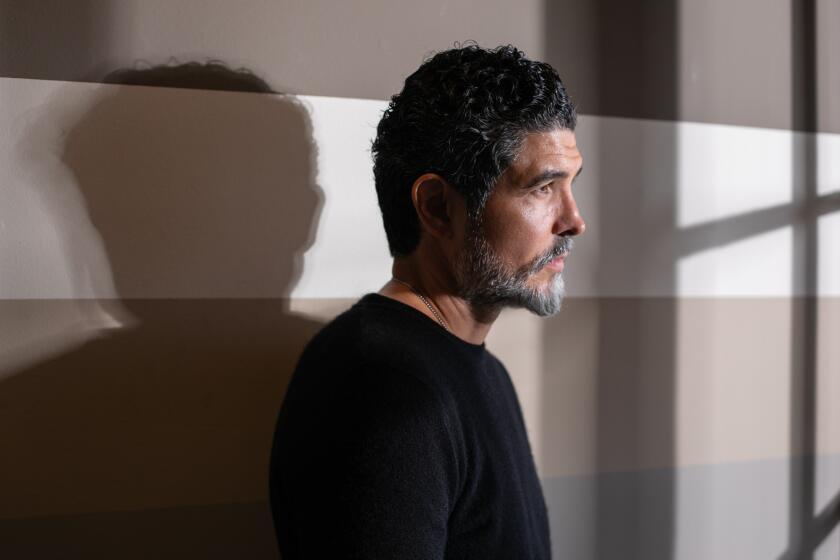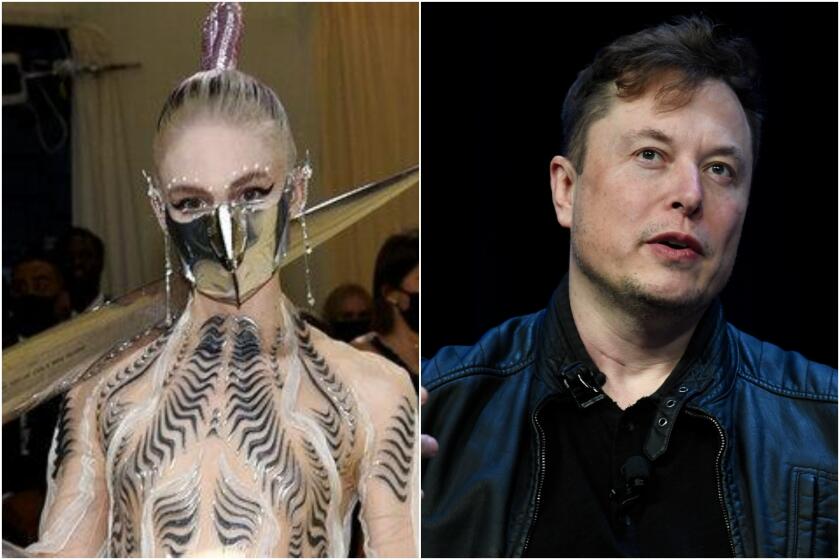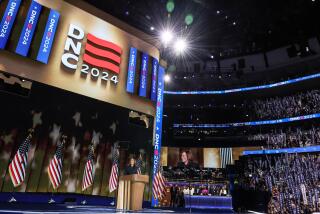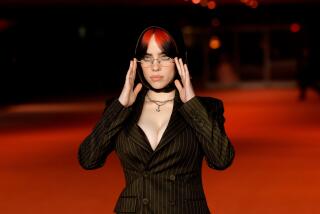Commentary: Bari Weiss’ big L.A. debate was less ‘free expression’ than self-promotion
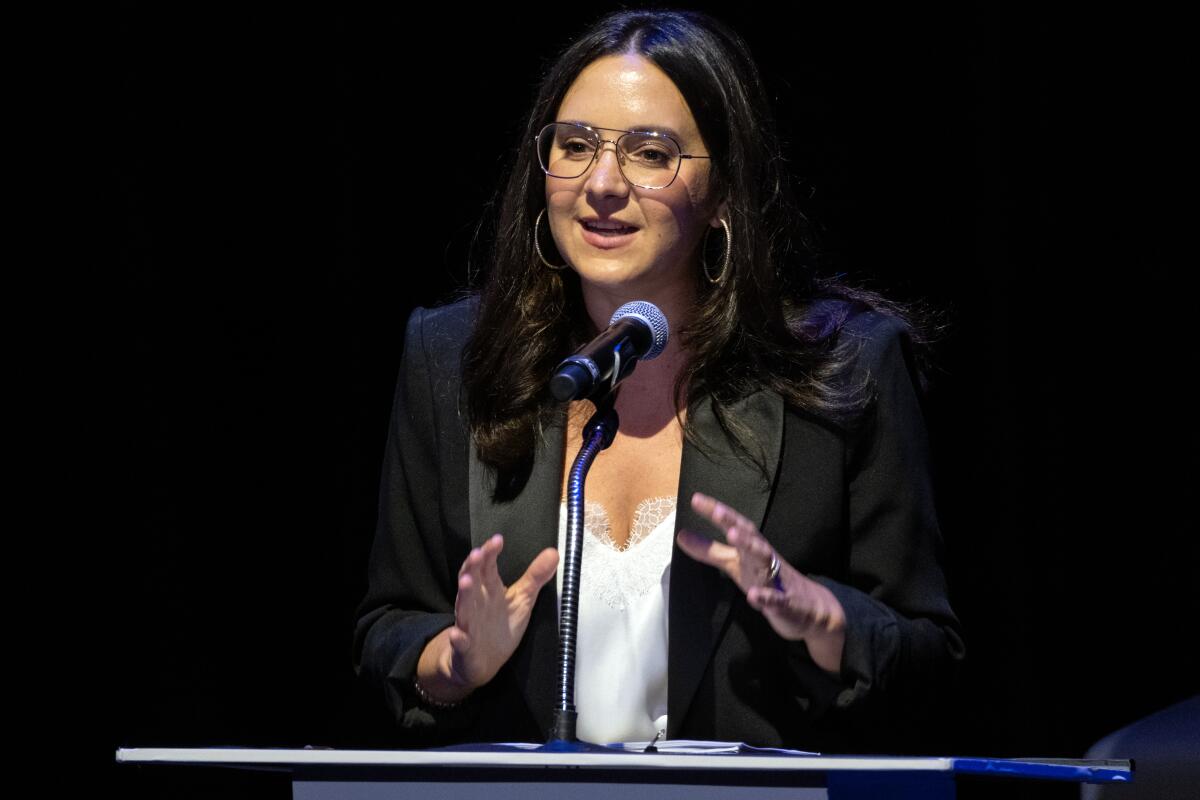
- Share via
Has the sexual revolution failed?
Five women took to the stage at the Theatre at Ace Hotel in downtown Los Angeles on Wednesday to debate an impossibly broad question with the promise of fireworks for an animated crowd, members of which paid up to $165 a ticket to witness a verbal brawl between cultural provocateurs.
Former New York Times opinion writer and full-time agitator Bari Weiss moderated the most-certainly-not-right-wing-how-could-you-even-suggest-such-a-thing event, which kicked off with comedian Tim Dillon joking about transgender teens and how bored he was with the war in Ukraine. The panel then was split into two teams: Author and Daily Mail writer Louise Perry and “Red Scare” podcaster Anna Khachiyan were positioned to argue that the movement failed, while musician Grimes and writer and podcaster Sarah Haider took the other side.
After weeks distancing himself from the controversy around his summer box-office sensation, Alejandro Monteverde finally tells ‘the whole story.’
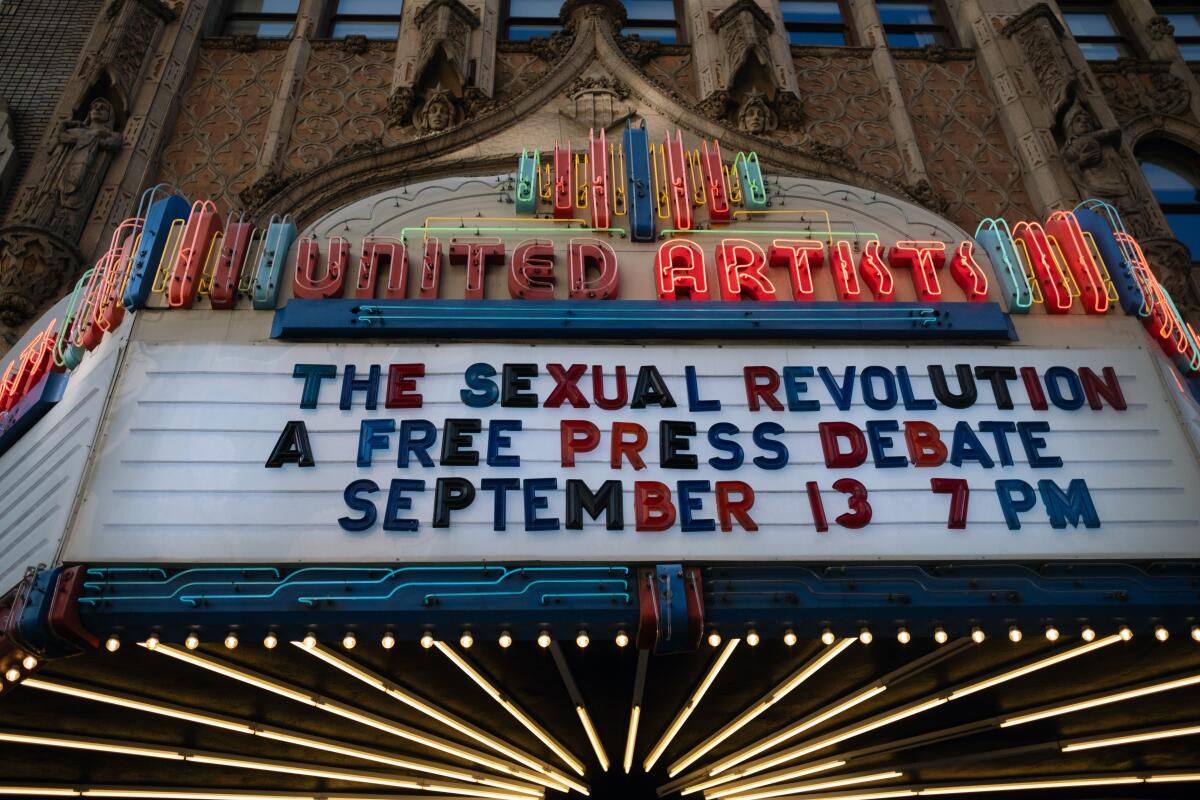
They were tasked with arguing whether the movement of the 1960s, ’70s and ’80s was responsible for making women happier or more depressed. Did the advent of the Pill exacerbate the sexual commodification of women, or liberate them? And are women having less sex and fewer orgasms now than they were in the atomic age?
If you’re looking for smart, incisive, even plain provocative dialogue about those questions, stop reading here. There was little to no daylight between the panelists’ views, and they were tethered by a common goal: calling attention to their own brands by sitting on the shoulders of the very movement that afforded them the freedom to sit on that stage and talk in circles.
As for the contentious viral moments that organizers might have hoped to leverage into financial support, followers or cultural cachet, those never happened. The audience of 1,600-plus, all primed to cheer the speakers’ adversarial views, found less and less to react to as the panel digressed. Rowdy millennials in Camille Paglia T-shirts, stoic middle-aged men in promotional “Free Press” baseball caps and well-groomed seniors in the pricey seats up front instead witnessed a group of like-minded women mostly agreeing with one another. There’s an art to skating on the edge of right-wing rage while pretending to be a nondenominational outsider, a skill Weiss has tried to harness over the years with varying degrees of success. Wednesday’s event was a prime example of what it looks like when the act falls flat.
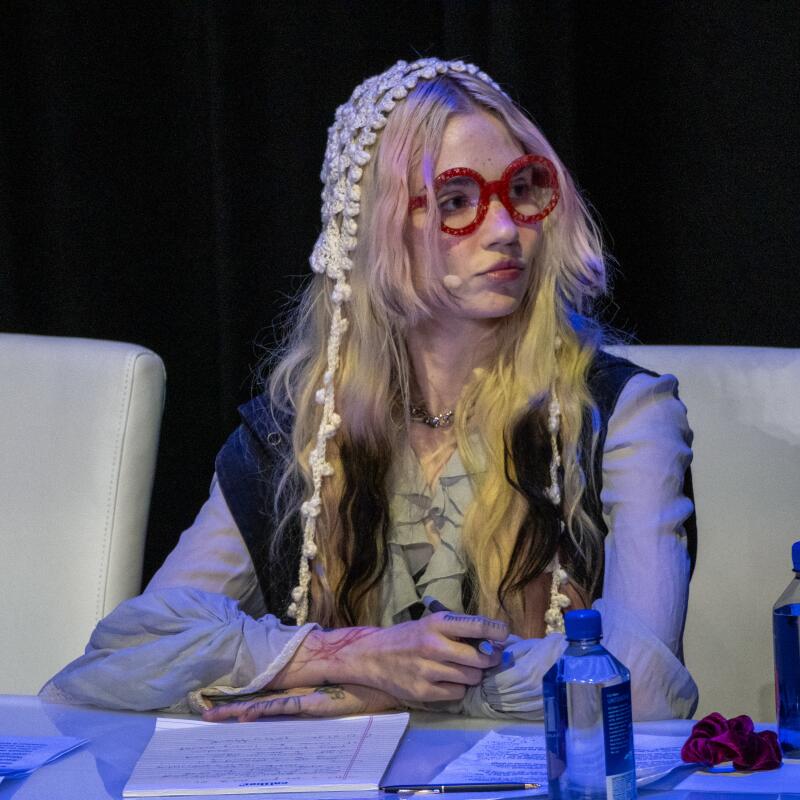
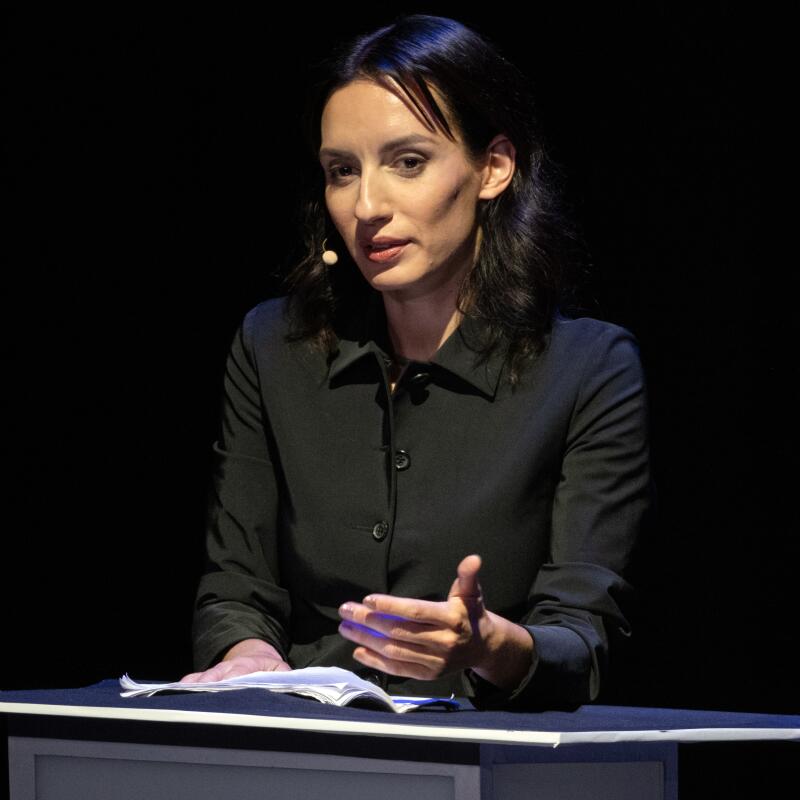
Musician and producer Grimes, left. and Anna Khachiyan, co-host of the podcast Red Scare. (Francine Orr / Los Angeles Times)

None of the participants appeared terribly well versed in the art of debate, either. The discussion was so disorganized and meandering it felt more like a “Black Lady Sketch Show” parody of a pseudo-intellectual lecture on feminism, but with no Black panelists and substance that borrowed from the contrarianism of Bill Maher, the antiliberalism of Newsmax and the prattle of a Young Republicans rally.
Perry admitted the movement had its upsides for women, but it’s been very hard on men, and we should all listen to our grandmothers now to get back to “normal.” Khachiyan, who found it necessary to vape during the discussion, proclaimed she was “a mother trying to keep her child out of the clutches of rabid ideologues, while making sure not to indoctrinate him too far in the opposite direction.” “Still, it would be hypocritical for me to blame the sexual revolution for everything,” she continued. “Instead I’d like to blame liberals.” All cited Paglia as their feminist hero except for Grimes, who appeared wholly unprepared for the rest of the panel’s canned talking points on second-wave feminism, intersectionality and sex-positivity. (As a result, the Canadian singer-songwriter came off as the only sincere voice of the bunch.)
Grimes spoke about her third child with Elon Musk and apologized to Shivon Zilis, the co-parent of Musk’s new twins, for comments she made online last week.
The debate was the first in a planned series organized by Weiss’ new media venture, the Free Press, and the Foundation for Individual Rights and Expression (FIRE), a group that claims to advocate for free speech on college campuses — except when the speakers don’t share its political views. (Weiss also has experience in this area.)
The two-hour main program started with remarks from Weiss, who wasted no time in mentioning how she’d been “canceled” more times than she could count. As a Columbia University undergraduate, she led a movement against professors who she felt were quashing her opinions. Later, she was brought on the New York Times during the Trump presidency to expand the scope of its Op-Ed section, but she left in 2020, claiming her “forays into Wrongthink have made me the subject of constant bullying by colleagues who disagree with my views.”
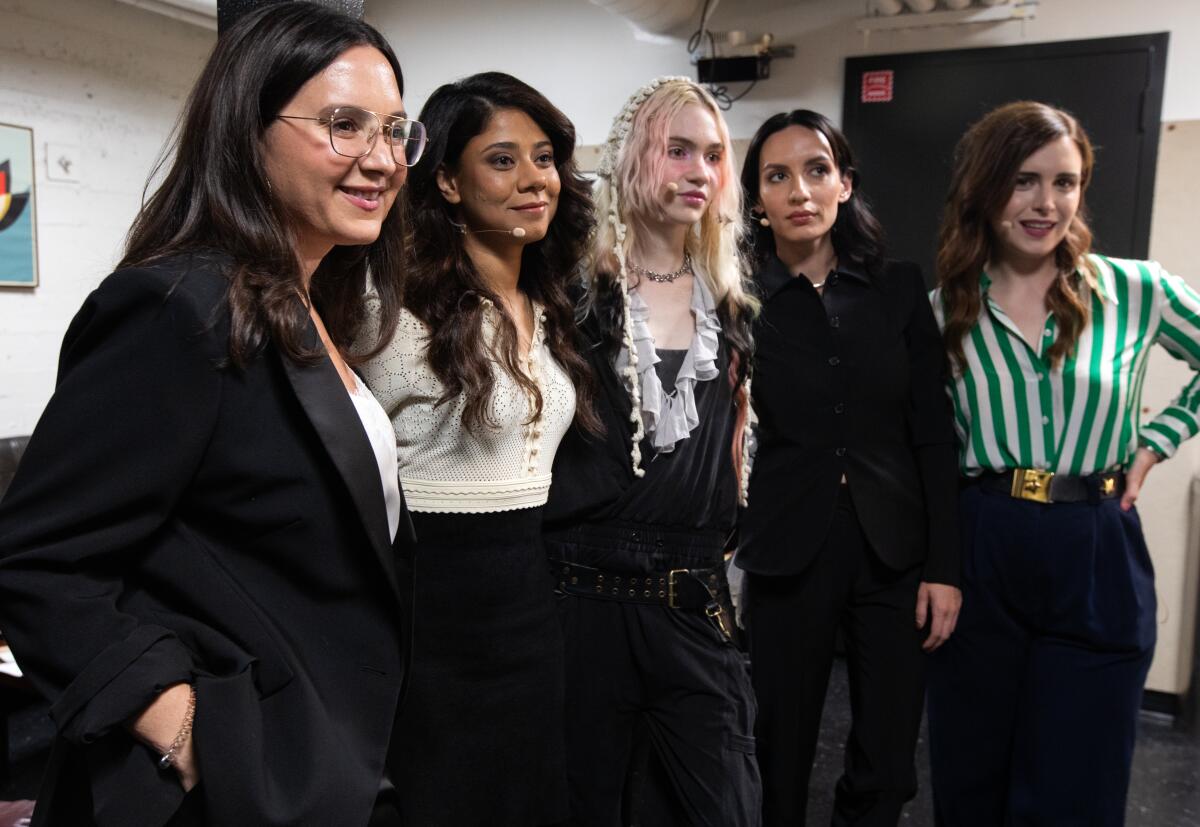
On Wednesday, Weiss referred more than once to a liberal culture that is too easily offended by opposing opinions — before turning to her panel of three same-minded activists and a singer-songwriter who was likely brought in to draw attention to the event. (Grimes, who has three children with her former partner, SpaceX executive Elon Musk, created a flurry of press this week when she suggested in a now-deleted social media post that Musk and his current partner were blocking her from seeing her son; the musician has since apologized.) Though Grimes couldn’t argue feminist theory like the other women onstage, she was the most authentic in expressing her belief that women, motherhood and children were undervalued in American society.
The debate started with a vote from the audience, via text, which found that the majority in attendance believed the sexual revolution had failed. By the end of the event, another vote showed the balance of opinion had changed by a few percentage points, but it remained unclear what else was accomplished besides Weiss getting a chance to hold court.
Real journalism? How about some truth in advertising: The debate’s title should have been “Agitating for Followers: the Art of Calling Attention to Oneself While Saying Absolutely Nothing.”
More to Read
The biggest entertainment stories
Get our big stories about Hollywood, film, television, music, arts, culture and more right in your inbox as soon as they publish.
You may occasionally receive promotional content from the Los Angeles Times.
